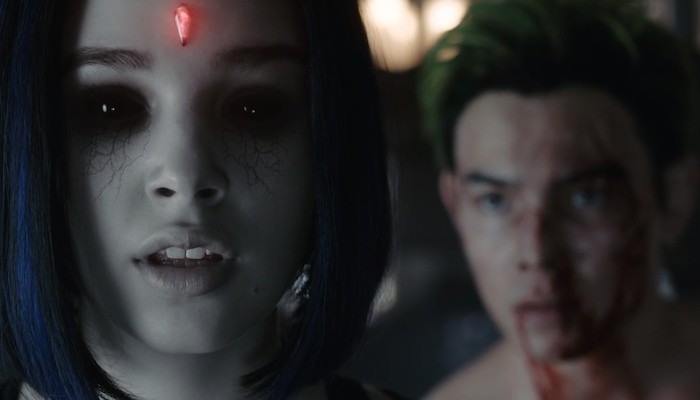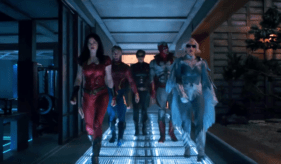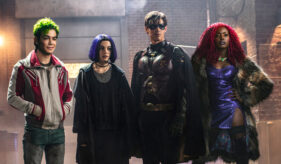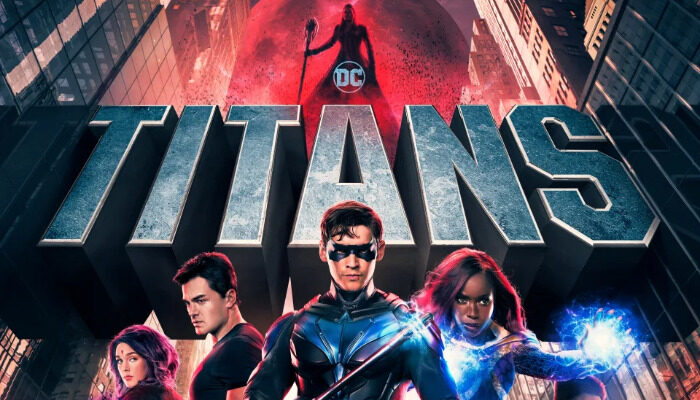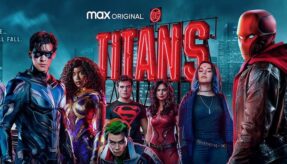TV Review: TITANS: Season 2, Episode 1: Trigon – A Betrayal of Trust, Insulting, & A Waste of What Came Before It [DC Universe]
Table of Contents
Titans Trigon Review
DC Universe‘s Titans: Season 2, Episode 1: Trigon is the death of the viewer taking this TV series seriously and the demise of the trust the viewer has placed in the show’s writers. The viewer can’t take Titans‘ writers seriously anymore following the events of this episode. If you loved Season 1 of Titans, Trigon literally and figuratively destroys almost all of the painstakingly-laid groundwork from that Season for one thing and one thing only – expediency (think Game of Thrones: Seasons 7 and 8).
Writers Akiva Goldsman, Geoff Johns, and Greg Walker wanted to get Trigon (Seamus Dever), his threat, his plotline, along with all of the lingering storylines from Season 1, tied up and extinguished in one fell swoop. They did so in absolutely the most deleterious fashion possible in two-thirds of one episode, this episode, so that they could quickly move on to introduce a new villain.
Question: Why would you build up an entire character, creating a mystical tapestry around him – organizations and followers that would die for that character – over the course of an entire season, and then kill that character off after that character is fully realized in 2/3s of the next season’s premiere?
This is a catastrophic decision, a completely unexpected turn of events, and a total letdown.
If Trigon was always this disposable, why waste an entire TV season building him, his mystique, and the organization enthralled to him up? Season Two of Yellowstone committed the exact same inexplicable sin with key storylines from its first season but even that show’s writers spent episodes getting rid of the previous season’s key plotlines after that series was renewed.
Titans‘ writers didn’t even give Trigon, or the other extinguished storylines from Season One, that tip of the hat before they destroyed them.
Raven’s Broken Heart
As soon as Rachel Roth / Raven (Teagan Croft)’s heart breaks (the end-point necessity of Trigon’s plan) and Trigon pulls said broken heart out of Raven’s chest, seemingly killing her, the episode starts to go down hill.
When Raven gets back up from the floor with the heart jewel in her head, just standing there, the viewer wonders why Trigon didn’t keep the jewel, and all of the power within it, for himself? Why didn’t Trigon put the jewel in his own head?
None of these questions get answered and that is a major fault within the episode.
The Mother’s Death
Trigon killing Rachel’s mother, Angela Azarath (Rachel Nichols), in Trigon is a meaningless, throwaway death. The death isn’t given time to breath and Azarath’s character is so underdeveloped, that when it happens, its irrelevant to everyone and everything in the episode and the series. There is zero reaction to that death from Raven when she sees her mother’s corpse on the ground (Raven doesn’t run to the body after she kills Trigon or say anything over her still-warm body). Angela’s death is not even spoken of after Raven kills Trigon.
It is a completely unrealistic response from a child losing their birth mother, even if that birth mother loved her evil husband more and chose that husband over her daughter.
The Rushed Final Confrontation
As soon as Raven nonchalantly walks out of the house to her inter-dimensional demon father, the established realism within the series dies. There is no tension in her strides, no fear, no trepidation in facing an entity of unchecked abilities. Raven is facing a demon with purportedly enough power and strength to destroy and consume an entire planet and she couldn’t care less.
Raven knows she is about to do something that is effortless to her, like a person opening up a refrigerator and taking out a carton of milk.
Killing this creature is a piece-of-cake for her, an illustration of how badly written this pivotal moment is for these two characters e.g. there is no emotional final confrontation between father and daughter when Raven steps up to the metaphoric plate. There is no climatic battle.
Because of these deficiencies, there is no satisfying conclusion to this pivotal and enormous storyline. On the contrary, its vapid.
What happens to Trigon, a Thanos-like snap performed by Raven, is empty and impact-less. The viewer feels nothing because the lie has been revealed. The viewer was promised something fulfilling in Season 1 and instead they are given a barren room with vacant shelves. It’s worse than that though. It’s worse than an anti-climax, though that is exactly what it is.
It’s writing malpractice.
After Trigon transforms from human to his true visage, all of his intuitive, clever, and manipulative brain cells evaporate. Once that characterization disappears, Trigon is nothing more than a horrendously animated CGI bad guy e.g. Steppenwolf from Justice League.
Evidence towards this assertion:
Trigon looks right at Raven, sees that her eyes and surrounding area are no longer black and no alarm is raised in him? She walks up to him of her own volition and he doesn’t tell her to do that. How is he not immediately on-guard because of this fact?
If Raven is still under his power, why is she talking? He doesn’t tell her to do that. Again, why no alarm and extreme apprehension in Trigon? Why no preemptive first attack? Why doesn’t he execute a strategic withdrawal and live to fight another day?
Trigon made Raven, knows what she is, so he knows her strengthens and weaknesses. Why doesn’t Trigon defend himself against Raven?
He just lets her mosey on up to him and kill him?
This entire sequence of events, this entire section of the episode, is rancid writing. Its setup, the events that transpire, and the characters’ reactions to them make no sense.
Melodramatic Robin and Bruce
Another emotional scene absent of emotion and given short-shift in Trigon is when Dick Grayson (Brenton Thwaites) makes amends with Bruce Wayne / Batman (Iain Glen) – a heart-to-heart moment between mentor and mentee.
Normally this would be a gratifying scene, a feelings-riddled crescendo, a reward to the faithful viewer that had seen the previous foibles of Dick and his blame of who and what he is on Batman.
This would be the big verbal confrontation, the mea culpa, the scene were the past is stabbed, allowed to bleed out, and die as platitudes of acceptance and forgiveness are dispensed.
That is and isn’t what the viewer gets in this scene.
The normal incarnation of this scene would be weighty, given time to breathe, allowing Bruce Wayne’s personality to come forth (one of the normal purposes of this scene) during the course of their conversation.
Unfortunately, like the dissolution of Trigon, this key moment in Trigon is sped up, speeding past golden character moments, the viewer feels the writers’ feet on the pedal.
Example: Dick and Bruce are talking about Jason Todd / Robin (Curran Walters) and Dick doesn’t tell Bruce that Todd attacked innocent police officers responding to a call and broke the back of one of them on purpose. Todd is a raving maniac and Grayson says nothing. Dick doesn’t warn his mentor about the vengeful monster in his midst.
This alacrity, accelerating over a thoughtful father / son resolution, is rooted in the true purpose of the scene – debut. The goal of the conversation is new funding and a new headquarters for the Titans.
From the beginning, this pivotal conversation is corrupted by its writers because it has this ulterior and ultimate goal. Combining two or more issues in a conversation happens all the time in a narrative, especially in a well-written one. But when you have a vast history between two characters and only produce from it a surface conversation then segway into a soft reboot of the TV series its contained in, the conservation shifts from something meaningful and heartfelt to a means to an end.
Early Access Question Answered
During the beginning of Titans: Season 2’s premiere week, I wondered why the first episode screener was released just two days before the episode aired (far too little turn-around time for a review). Screeners are usually released on Monday or Tuesday (at the latest) if the episode is airing on Friday. I initially thought the DC Universe’s PR people just weren’t on the ball this season.
That wasn’t it at all. It’s that Trigon is such a lousy episode and jarringly transitory that they didn’t want these facts getting out before the premiere.
This is one of the worst season premiere episodes that I have ever seen.
Leave your thoughts on this Titans Trigon review and this episode of Titans below in the comments section. Readers seeking to support this type of content can visit our Patreon Page and become one of FilmBook’s patrons. Readers seeking more Titans can visit our Titans Page. Readers seeking more TV show reviews can visit our TV Show Review Page and our TV Show Review Twitter Page. Want up-to-the-minute notification? FilmBook staff members publish articles by Email, Twitter, Instagram, Tumblr, and Flipboard.
Related Articles
FilmBook's Newsletter
Subscribe to FilmBook’s Daily Newsletter for the latest news!







